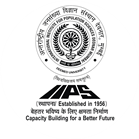- About IIPS
- Academics
- Study @ IIPS
- Departments
- Centres
- Controller of Examination
- Programme
- Distance and Online Education
- Training
- Facilities/Services
- Resources
- Virtual Learning
- Digital Initiatives (MHRD)
- Notice
- Seminars / Workshops / Conferences
- Conferences
- Publications
- Seminars
- Sponsored Research
- Workshops
- Collaboration
- National
- International
- NEP 2020
- Admission
- Courses
- Admission Bulletin
- TIME-TABLE For Admission 2025-26
- Model Question Papers
- Programme Coordinators
- Fellowships
- Academic Calendar
- International Students
- Visa Information
- Administration
- Faculty & Staff
- Research & Publications
- Library
- Information
- Right to Information
- Vigilance Officer
- Annual Report
- Director's Report
- Cells & Commitees
- Cells
- Commitees
- Committees of NEP 2020
- Staff Walfare Committee
- Cultural Committee
- Internal Committee
- Purchase Commitee
- Students Academic Committee
- Student Research Ethics Committee
- Anti-Ragging Committee
- Institutional Review Board
- Social Media Committee
- Prevention of Caste-based Discrimination Committee
- Code of Conduct and Professional Ethics
- National and International honours, Awards, Recognition, and Medals
- Online Facilities
- Employee's Corner
- Memorial Lectures
- Convocation
- IIPS Newsletters
- COVID 19 Information
- Life @ IIPS
Understanding Successful Ageing in the Indian Context: A Critical Review towards a Multidimensional and Culturally Grounded Framework
- Home
- Understanding Successful Ageing in the Indian Context: A Critical Review towards a Multidimensional and Culturally Grounded Framework
Abstract Content (not more than 300 word, should include: Introduction, Objective, Methodology, critical findings & Conclusion):
India is undergoing a demographic transition, marked by a rapidly growing ageing population, which is projected to constitute nearly one-fifth of the nation’s total by 2050. Against this backdrop, understanding the concept of successful ageing has become increasingly vital for shaping policy for elderly. This paper presents critical review of literature on successful ageing, with particular emphasis on conceptualization, correlates, and cultural relevance within the Indian context. Drawing 15 peer-reviewed studies published between 1994-2023, this review examines various aspects of successful ageing, encompassing physical and cognitive health, social engagement, economic independence, and subjective well-being. The findings reveal that while biomedical models, dominate global discourse, Indian perspectives emphasize familial ties, interdependence, and socio-cultural belonging as core determinants of ageing well. Gender, rural–urban residence, and socioeconomic disparities emerge as significant structural determinants shaping older adults’ opportunities for successful ageing. The review also identifies substantial research gaps concerning nutrition, technological engagement, policy interventions, and the role of emotional well-being, particularly happiness, in influencing ageing trajectories. Furthermore, the study highlights the need to re-conceptualize successful ageing beyond Western frameworks by integrating India’s cultural heterogeneity and social realities. Overall, this paper argues for a multidimensional and contextually grounded understanding of successful ageing in India, one that embraces physical vitality, mental resilience, social connectedness, and economic security as interconnected pillars of later-life well-being. Such an approach can inform inclusive gerontological research and evidence-based policymaking aimed at fostering dignity, independence, and quality of life among India’s older population.
Abstract theme:
In case of not been selected for oral presentation, do you want to be considered for the poster presentation ?:
No
Do you require financial support to attend the seminar ? (Not applicable for virtual meet):
Yes-full
Gender:
Female
Evaluation Status:
No
